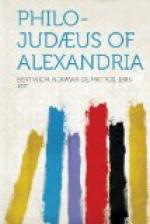It had been one of the chief functions of the prophets to demonstrate the moral import of the law. In their vision the God of Israel became the God of the universe, and His law of conduct was spread over all mankind. “For the law shall go forth from Zion, and the word of the Lord from Jerusalem” (Micah iv. 2). Philo in effect expounds Judaism in their spirit, though he speaks their message in the voice of Plato and to a people whose minds were trained in Greek culture. Yet it is significant that he wrote all his commentaries round the Five Books of Moses, and used the prophets and other Biblical books only to illustrate and support the Mosaic teaching, which contains the whole way of life and the whole religious philosophy. According to the rabbis also the Prophets formed only a complement to the Torah, “a species of Agadah";[129] and the prophetic vision of Moses was much clearer than that of his successors. Philo, too, clearly realized that Judaism was the religion of the law. His view of the Torah is what the modern world would call uncritical: that is to say, he accepts the idea that the whole of the Five Books was an objective revelation to Moses at Sinai. But though—or because—he is innocent of the higher criticism, and believes in the literal inspiration of the Torah, his conception is none the less enlightened and spiritual. The law—the Divine Logos—is not the enactment of an outside power, arbitrarily imposed, and to be obeyed because of its miraculous origin; it is the expression of the human soul within, when raised to its highest power by the Divine inspiration. Every man may fit himself to receive the Divine word, which is, in modern language, revelation.[130] Moses, then, is distinguished above all other legislators, not because he alone received it, but because he received it in its purest form, and because he was the most noble interpreter of it. It is for this reason that the law of Moses is of universal validity for conduct. The Divine spirit possessed him so fully that his Logos, or revelation, is eternally true, and by following it all men become fit to be blessed with the Divine gift themselves. This is true of the other prophets of the Bible to a smaller degree, and in a still minor degree Philo hoped that it was true of himself.




